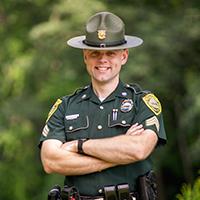State Trooper Advances His Law Enforcement Profession and Career

Sean Eaton: A Passion for Community Policing
Located in the southwest corner of the state, New Hampshire State Police Troop C is responsible for providing police services throughout Sullivan and Cheshire Counties, including coverage to 38 communities. While Troop C’s primary function is deterring, stopping, and investigating crimes and serving as first responders for emergencies that threaten public safety, Sergeant Sean Eaton, a 15-year veteran with the NH State Police, believes one of the best ways to accomplish these critical functions is building public trust and community confidence.
Sean’s interest in public service began, in part, because of the community-based education program Drug Abuse Resistance Education (D.A.R.E.). D.A.R.E. fosters a positive relationship between youth and community-based police officers.
I wanted to be in law enforcement since I was really young. My dad had been a police officer, which inspired my earliest interest. Later, I remember the police chief of our town presented the D.A.R.E. curriculum in our school. He knew I was a mature teenager and hyper-focused on reaching my goal of a career in law enforcement. He took a chance and allowed me to work part-time for the local police department. I never looked back.
Having Compassion, Building Trust
While police receive their authority from the state and the law, Sean says they earn it from the public in every interaction. Recently, a public donation of stuffed animals intended to calm children during traumatic contacts helped Sean experience community policing in a powerful way.
Generally, when we’re involved it’s not on someone’s best day. But I’ve had far more positive interactions than negative ones. Having compassion helps us build trust and rapport. It also helps bring healing to traumatic situations.
Meeting the Complex Demands of the Modern Police Force

Many things have changed over Sean’s twenty-plus-year career, with national events shaping how law enforcement at the state and local level fulfills its duty to the public. To consider the many national tragedies that have impacted our nation is to understand the unprecedented demand for the cooperation of law enforcement agencies, enhancement of technology, and advancement of its professionals’ skills, leadership capabilities, and critical decision-making.
Sean was a recent high school graduate and part-time recruit when the 9/11 Terrorist Attacks changed our nation forever. Since, events like Hurricane Katrina and its aftermath, the Boston Marathon Bombing, horrifying gun violence at Sandy Hook Elementary School, the massacre at the Tree of Life Synagogue, and the insurrection at the U.S. Capitol have transformed how law enforcement assesses risk, prepares and responds, coordinates, and engages in self-examination. Our country continues to engage in a nationwide conversation regarding law enforcement, social justice, and the need for reforms that enhance transparency in police work.
Adaptability, Agility, and Empathy
Locally, the NH Police Standards and Training Council’s (NHPSTC) role is to strengthen the competency and professionalism of New Hampshire law enforcement. Sean describes that education and training help professionals achieve that mission.
There’s growing complexity in law enforcement work. That won’t change. This profession is demanding. It requires adaptability, agility, and empathy to do it well. Continuous learning is something I’m committed to. I tell folks who ask that they should learn as much as they can. There’s always room for improvement. Make yourself fitter, stronger, better. Do the same with school. It’s another toolset.
Going Back to College Later in His Career
Sean launched into his police career with no formal training. He progressed over time. His first college experience began shortly after graduating from the NH Police Standards and Training Council program. He attended a community college nearby where he was living.
At that time, I was more focused on learning the day-to-day of my job, so I stopped going to school — which I regretted. I wanted to go back to finish what I started.
Soon after joining the NH State Police, he enrolled at NHTI in the online Criminal Justice program, which gave him a greater appreciation for how the disciplines of biology, psychology, sociology, and political science were woven into the study of criminology. In time, with experience and a solid educational foundation, Sean advanced up the ranks to sergeant.
When I got promoted to a leadership role, I wanted to develop myself and learn to mentor the troopers coming up behind me. I took the Certified Public Manager program training through the State and it reignited my interest in leadership. That’s when a familiar feeling came back and I knew it was time to finish the bachelor’s degree.
A Flexible Online Education
Given the college’s long history of supporting first responders with programs designed in collaboration with police, fire, and other first responders, Sean talked with his peers and opted to learn more about the college’s Public Administration program.
The college made getting back to school seamless. It wasn’t a difficult transition. Between my prior college credits and NHPST, I had more than enough credits in transfer. That helped me maximize my time. While the decision to return is still an investment, the State’s tuition partnership with the college makes managing the cost reasonable. Ultimately though, I made my decision because the online format makes it possible to balance my life at work and home with classes.
Balancing Family Life, Work, and Education

Sean and his wife, Cassie, have been best friends and partners since high school. Now that they have two active children with commitments of their own, Madelyn (12) and Kaylee (8), they made the decision for Sean to return to school together.
This career is hard on families, but my wife is amazing. She’s been my biggest supporter from the early days at the Police Academy to today with my career and school. Together, we’re doing everything to be the best parents to our children. I work long hours and have many responsibilities, but when I’m home, I’m just dad. I hope that by returning to school, it is one more way I can be an example in their lives.
Bringing His Experience in the Field Into the Classroom
In Sean’s current courses, Leadership and Organizational Behavior, he describes the ease with which he can relate topics to his own role and organization. As a leader, he has greater influence in operations and can apply new understanding and lessons learned to improve processes and practices.
Applying what I’ve learned in real-time makes it that much more beneficial. I also like introducing a new perspective to class discussions. As a trooper, I feel I have a responsibility to be a learner and a teacher.
Prepared for Whatever is Next
When his career in law enforcement ends, Sean acknowledges that he may do something completely different than what he’s been trained for as an officer and sergeant. But he encourages fellow officers to prepare for what’s next while currently in service.
In many ways, Sean has become the positive community and professional role model that inspired him years ago.